First things first. I was very far off in my predictions for the Galas and Batu Sapi by-elections. I had predicted a victory for PAS in the Galas by-election by a majority of 370 votes and a victory for BN in the Batu Sapi election by a majority of 1,800 votes.
I further predicted that SAPP would edge out Pakatan Rakyat in the fight for second place. BN won Galas with a surprising 1,190-vote majority. It also won Batu Sapi with a 6,359-vote majority with Pakatan easily outpacing SAPP by a margin of 1,382 votes.
In the same article , I also stated that I decomposed by predictions into different parts "so that I know exactly where I went wrong and where I went right after the election results are known". The following analysis is my attempt to do exactly what I said I would do: analyze the decomposed parts on where I went wrong.
Galas first, the numbers
I had predicted that the Malay support for Umno in Galas would increase by 6% - from 42% to 48% - on the basis of the trends in the post-March 2008 by-elections.
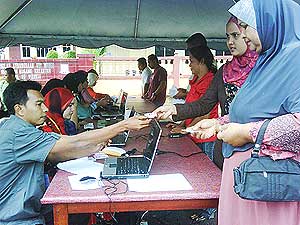 I was not too far off. My analysis of the polling station results showed that the Malay support for BN increased by 7% to a slightly over 49%. In other words, the Malay vote in Galas (minus the postal votes) was more or less evenly split.
I was not too far off. My analysis of the polling station results showed that the Malay support for BN increased by 7% to a slightly over 49%. In other words, the Malay vote in Galas (minus the postal votes) was more or less evenly split.
I also said that BN's support among the Orang Asli would increase by 6% from 64% in 2008 to 70%. An analysis of the Orang Asli polling stations showed an increase of 14% to 78%! In addition, the increase in turnout among the Orang Asli polling stations was also significant, from below 70% in 2008 to close to 90% in some polling stations in this by-election.
Finally, and this is where I got the direction of the swing wrong - the shift in the level of BN support among the Chinese voters which I anticipated to swing by 12% in favour of Pakatan. Instead, the level of BN support among the Chinese increased by 3% from 48% to 51%.
Putting these three factors together, in decreasing order of importance, are the reasons where my prediction went wrong: the higher-than-expected turnout and BN support among the Orang Asli, the small shift in the level of Chinese support towards BN, and the slightly larger-than-anticipated shift in the Malay support towards BN.
Galas: What it means
The devil is always in the details, especially when it comes to election analysis. The larger-than-expected Umno majority of 1,190 votes should be an encouraging sign for BN leaders, but it should also be taken with a pinch of salt.
Out of the 1,190 majority, 1,001 of that came from the Orang Asli polling stations. In other words, 84% of the winning majority came from 15% of the voting population from a single ethnic group (Yes, I understand that there are different Orang Asli groups but you get the point).
Another 121 of the winning majority was provided by the postal votes which comprises of less than 2% of the voting population. In the other polling stations - the remaining 83% of the voters - the BN won a majority of 68 votes.
This is not to say that the Orang Asli or the postal votes should count less than the votes of the other 83% of the voters in Galas. But it would be inaccurate to use Galas as a springboard to make more generalised conclusions, such as the fact that the Chinese vote has swung back to BN in very significant terms. Yes, a majority of the Chinese in Galas did vote for BN but it was a small majority.
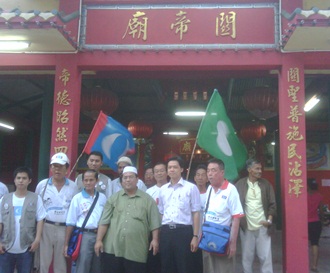 For example, in the small 83% majority Chinese polling station of Kampung Pulai, the support for the BN increased from 51% in 2008 to 54% in the recent by-election. Not exactly something to crow about. Especially if one were to look back at the 2004 and 1999 election results where the BN won 61% and 75% of the vote in this same polling station.
For example, in the small 83% majority Chinese polling station of Kampung Pulai, the support for the BN increased from 51% in 2008 to 54% in the recent by-election. Not exactly something to crow about. Especially if one were to look back at the 2004 and 1999 election results where the BN won 61% and 75% of the vote in this same polling station.
A 54% level of support in a polling station where the BN held free dinners and gave away lucky-draw prizes almost on a nightly basis since nominations day isn't exactly a great return on investment especially when one considers that the result of this was an increase in the majority for BN from 25 to 44 votes in this polling station.
Of course, one could argue that without these free dinners and giveaways, there would have been a swing against the BN. Still, the point remains, which is that the BN should not be overconfident about a more general swing among the Chinese voters back to BN, especially in the larger and more urbanised constituencies which many of these voters can be found.
The other implication raised in this by-election is the importance of the Orang Asli vote in some of these more marginal constituencies. In my prediction piece, I had indicated that there has been a concerted effort among the JHEOA (Orang Asli Affairs Department) to register more Orang Asli as voters on the assumption that these voters would be more sympathetic towards the BN because of certain carrot and sticks which can be used to gain their support.
Is this strategy likely to work in other parts of Peninsular Malaysia such as Perak and Pahang, for example, especially in the more marginal seats? It is a point which needs further investigation, using more updated electoral roll data on a national basis.
The last implication raised is something I alluded to before in my prediction piece which is the strength and influence of Tengku Razaleigh Hamzah.
I said that I did not anticipate the ‘Ku Li' factor to play a significant role here. I still stand by that assertion. The Malay vote in Galas did not swing by 10%, it only swung by 7% - a bit higher than the Malay vote swing in Manek Urai where the ‘Ku Li' factor probably did not play much of a role.
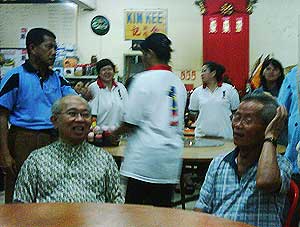 The ‘Ku Li' factor did swing the Chinese vote above the 50% mark. And it would probably be far-fetched to say that the ‘Ku Li' factor was the main driving force behind the high turnout in the Orang Asli majority polling stations. Other government agencies I think played a much bigger role.
The ‘Ku Li' factor did swing the Chinese vote above the 50% mark. And it would probably be far-fetched to say that the ‘Ku Li' factor was the main driving force behind the high turnout in the Orang Asli majority polling stations. Other government agencies I think played a much bigger role.
So while ‘Ku Li' may temporarily bask in this BN victory in his backyard, it would be erroneous to say that he will be able to use this as a springboard back to national relevance within Umno. And where the prevailing mantra in politics is ‘what have you done for me lately', this ‘achievement' by Ku Li will soon be forgotten by many in his party.
Batu Sapi: The numbers first
I noted in my earlier piece that predicting Batu Sapi would be much more difficult given that it was a three-way fight. I had predicted that the Chinese support for the BN would fall to 20% from 40% in 2008. I was wrong.
The Chinese support for the BN did fall, but by only 5% to 35%. This was because Yong Teck Lee, the SAPP candidate and the former Sabah chief minister failed to capture the imagination of a sufficient number of Chinese voters.
I also predicted that the support for BN among the non-Chinese voters would fall from 65% in 2008 to 55% in 2010 on the basis of discontentment with the state government in dealing with the issues of poverty that affect most of the non-Chinese voters in this area adjoining Sandakan. Again, I was wrong.
The level of BN support among non-Chinese actually increased by 15% to 80%. This explains why the majority for BN increased (even if one were to combine the votes of the two opposition candidates) despite that its support among the Chinese voters fell.
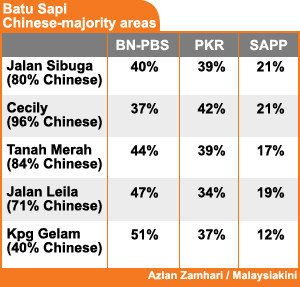 The other surprise, at least to me, was the fact that the non-Chinese candidate from PKR actually managed to win more votes in the Chinese-majority areas than the Chinese SAPP candidate. This explains why Pakatan was successful in beating SAPP to second place, despite not having any sort of decent election machinery in this constituency.
The other surprise, at least to me, was the fact that the non-Chinese candidate from PKR actually managed to win more votes in the Chinese-majority areas than the Chinese SAPP candidate. This explains why Pakatan was successful in beating SAPP to second place, despite not having any sort of decent election machinery in this constituency.
The results above show Pakatan clearly outdistancing SAPP in the fight for the Chinese votes, despite it did not field a Chinese candidate. In fact, in Cecily - the highest Chinese-majority polling station - PKR actually won more votes than BN.
Batu Sapi: The implications
In my prediction piece, I stated that even though Galas results would be closer than Batu Sapi, the implications from the Batu Sapi by-election would be more significant in terms of its effect on the next general election. I had originally said that SAPP would be able to act as a spoiler party and demand more seats from Pakatan should it win more votes than PKR in this by-election.
Given that Pakatan won more votes than SAPP and more importantly, that it clearly won more Chinese votes than SAPP, a predominantly Chinese-based party, it would not be erroneous to conclude that SAPP's political relevance in Sabah has diminished significantly. It cannot make the claim, credibly anyways, to want to compete in 40 out of 60 state seats especially when it cannot even defend its home ground - the Chinese voters.
As important is the fact that the voters in Sabah now knows that SAPP is not a credible political option, which means that in a putative three-cornered fight, the ability of SAPP to play the role of spoiler no longer has the same threat level to Pakatan. Outside of Likas, where Yong Teck Lee was once the state representative, I doubt very much that any SAPP candidate fielded would be able to win more than 10% of the votes.
If there was a silver lining for Pakatan in this by-election, it would be this - that it has bought itself the opportunity to emerge as a credible opposition force in this state despite having to live with the label of being a Peninsular Malaysia-based entity.
Lessons for Pakatan
Make no mistake, these two were morale boosting by-election wins for BN. The BN needed these wins and the increased majority to encourage its leadership, members and supporters as preparations are made for the next general election.
There are important lessons to be learned here if Pakatan is to regain back some of the momentum it has lost as a result of these by-elections.
Firstly , Pakatan needs to continue its efforts in defining its own identity and how this identity stands in contrast with that of BN. Like it or not, as nebulous and hazy as it sounds, the whole 1Malaysia sloganeering seems to have worked for PM Najib Razak in ‘branding' the story which he wants to ‘sell' to the Malaysian public.
Beyond the Common Policy Framework or the fight for social justice (which is half-heartedly embraced by PAS) or shouts of reformasi (which is a bit passé), there has not been any effort to ‘brand' Pakatan in a way which distinguishes it from the BN in a way which can capture the hearts, minds and imagination of the Malaysian public.
 The task of giving Pakatan a common identity is even more urgent with today's announcement that Zaid Ibrahim is
resigning from all of his PKR posts
. Zaid was supposed to be the man who could bring about the various parties within Pakatan by institutionalising the opposition coalition, including registering the coalition as an official political party. Who will step up to the plate now that Zaid has stepped down from the PKR leadership and by extension, Pakatan?
The task of giving Pakatan a common identity is even more urgent with today's announcement that Zaid Ibrahim is
resigning from all of his PKR posts
. Zaid was supposed to be the man who could bring about the various parties within Pakatan by institutionalising the opposition coalition, including registering the coalition as an official political party. Who will step up to the plate now that Zaid has stepped down from the PKR leadership and by extension, Pakatan?
Secondly , the process of party building and institutionalisation needs to continue within what is widely recognised as the weakest link in the Pakatan coalition, namely PKR. The organisational problems associated with the PKR national party elections have been good blog and twitter fodder for anti-Pakatan elements as well as for the mainstream media.
While some of these criticisms and highlighting of shortcomings have been blown out of proportion, it is undeniable that PKR is the most poorly institutionalised of the three parties in Pakatan and also has the most disorganised and least effective grassroots machinery. The result of which is the continued scepticism by members of the public towards PKR and hence, by extension, towards Pakatan as a whole.
The task of ‘rebuilding' PKR's image after the conclusion of the national party elections will inevitably rest of the shoulders of the likely deputy president, Azmin Ali.
Azmin not only has the unenviable task for rebuilding PKR's image and strengthening it from an organisational and institutional perspective, he also has the responsibility of convincing members of the public that he is not just another Umno politician, cut from the same cloth, but that he is a national leader with his own vision for his party, his constituencies and most importantly, for the country.
Thirdly , Pakatan needs to realise that public service delivery at the local level is crucial if it wants to retain many of the marginal seats which it won in 2008. Among the feedback I received from Galas was the fact that the PAS-appointed ketua kampung (or village chiefs) in the areas with a significant Chinese population were doing a very poor job in listening and attending to the needs of the local community.
Even with this feedback, the PAS state government was slow in pushing these ketua kampung to do their jobs and to replace them if they didn't. Similarly, the PAS state government had not consistent and coherent plan to empower and help the Orang Asli community in Kelantan, many of whom can be found in the Gua Musang constituency.
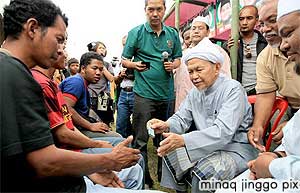 For Kelantan Menteri Besar Nik Aziz Nik Mat to deliver zakat aid to Muslim converts among the Orang Asli in Galas a few days before polling day is just another stark reminder to these voters that the PAS government is just like the federal, BN-led government whose main (and sometimes only) interest seems to be wanting to convince them to convert to Islam.
For Kelantan Menteri Besar Nik Aziz Nik Mat to deliver zakat aid to Muslim converts among the Orang Asli in Galas a few days before polling day is just another stark reminder to these voters that the PAS government is just like the federal, BN-led government whose main (and sometimes only) interest seems to be wanting to convince them to convert to Islam.
If the PAS-led Kedah state government were to continue on a similar trajectory (which seems to be the consistent feedback coming from that state), I would not be surprised if many of the non-Malay majority parliament and state seats, which were won by Pakatan in 2008 on the basis of the non-Malay vote, may tip back to BN in the next general elections.
The die not yet cast
The effort to rebrand and to rebuild Pakatan involves each and every party within the opposition coalition.
Many significant steps have already been taken, for example, over the discussions on the use of the word ‘Allah' by the Christian community in Malaysia. There is a genuine spirit of wanting to negotiate over the difficult issues within Pakatan, unlike in the BN where Umno simply rides roughshod over its coalition partners.
But how does that translate into a larger message which can inspire and excite the larger public and fight away the inevitable attacks which will come from BN in the form of fear mongering about Malays losing their rights under a Pakatan government or the ever present ‘bogeyman' of an Islamic state under PAS?
These are some of the hard questions with Pakatan will have to deal with. I hope that some of them can be answer at Pakatan's second delegates conference in Penang in December. One week is a long time in politics. The die is not yet cast in terms of the outcome of the next general election.
Both sides will have their work cut out for them. BN will have to work hard to win back the non-Malay votes if it wants to retake Selangor and the two-thirds majority in parliament. Pakatan would have to work even harder to give the voters a positive message about how they are going to transform the country when they get to Putrajaya.
In the meantime, political life in Malaysia remains fluid and exciting for political analysts like myself.
Eight reasons why Pakatan lost
ONG KIAN MING holds a PhD in political science from Duke University. His twitter handle is imokman and he can be reached at [email protected]. He is currently attached to UCSI University where he is pioneering a Masters in Public Policy (MPP) course together with another Malaysiakini columnist, Dr KJ John. He is also the director of OKM Consulting Sdn Bhd.

